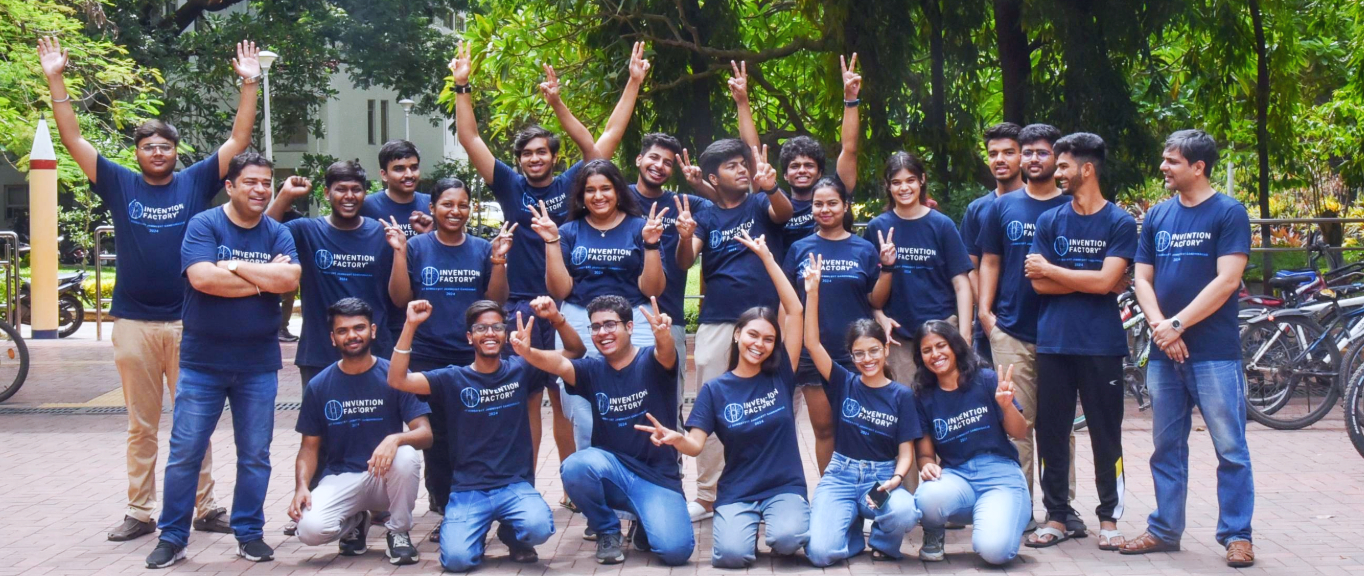Trailblazing Innovations: Insights from IIT Bombay’s Invention Factory 2024
Students from the IITs and NITs all across India came together for six weeks where they ideated, prototyped, and pitched their innovative products that address critical societal and consumer needs to an illustrious panel of judges.
And on July 12, 2024, the Invention Factory Program crowned its top three winners!
Winning Team:
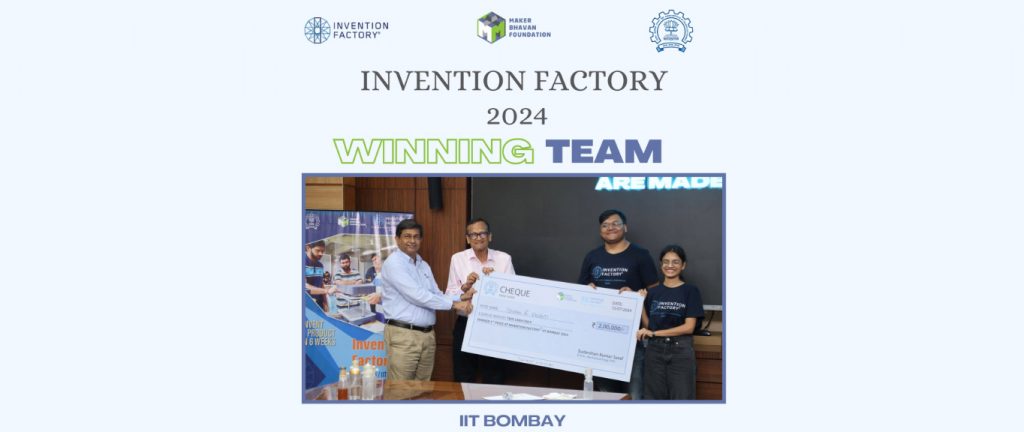
Ishan Agarwal (IIT Gandhinagar) and Vrushti Shah (Nirma University, Ahmedabad, Gujarat, India) took home the top prize for developing a therapeutic pain relief device designed to alleviate muscle spasms through pulsating pressure using air compression. The device features an integrated medicine delivery system for deep muscle penetration, providing effective relief and promoting relaxation.
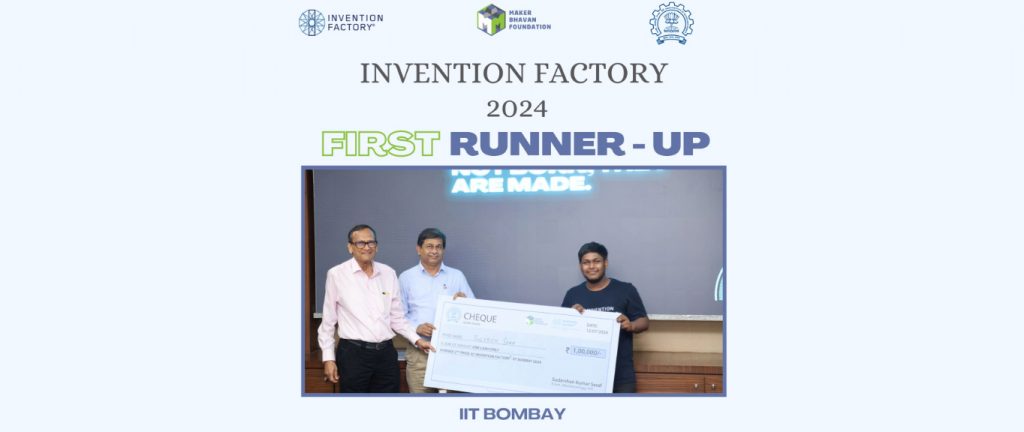
First Runner-up:
Sheersh Shah (IIT Delhi) was the First Runner-up. Sheersh addressed the inefficiency and environmental impact of existing food delivery bags. Traditional delivery bags often fail to prevent spillage and do not support the use of paper containers effectively, leading to increased plastic waste and poor customer satisfaction. Sheersh developed an add-on for existing delivery bags made with eco-friendly materials and snap-fit technology, enhancing the use of paper packaging and reducing plastic waste.
Second Runner-up:
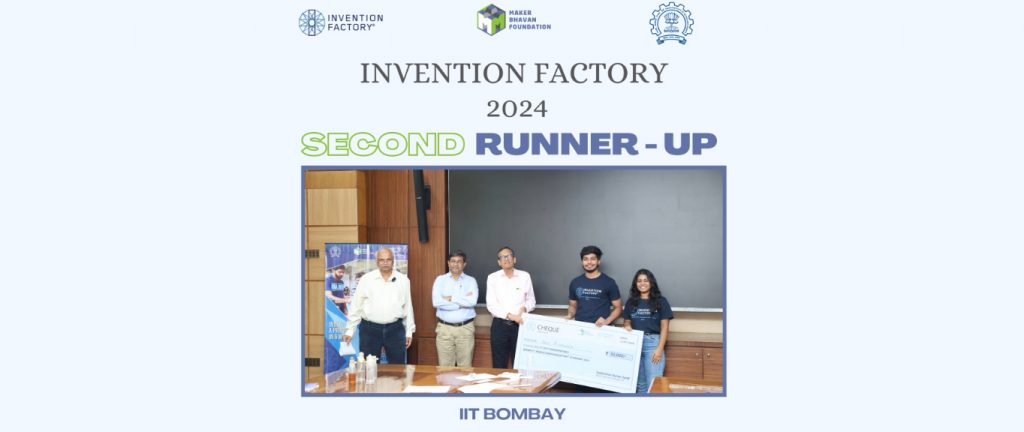
Sahil Rao (IIT Jammu) and Harshada Kale (IIT Gandhinagar) took home the 2nd Runner-Up prize. They tackled the inconvenience and safety issues associated with soldering by developing an attachment for the soldering iron. This attachment includes a lightweight insulation cover with ventilation holes and a separate solder wire feeder, improving efficiency and safety for users.
The Birth of Invention Factory in India
Organized by the American-based non-profit organization, the Maker Bhavan Foundation (MBF), the IF program was originally launched in India in 2018 at IIT Gandhinagar and subsequently moved on to IIT Bombay in 2022 and kickstarted at IIT Jammu in 2023. IF came about as a result of students in India having a solid background in core sciences during their grades 11 and 12, but whose first few semesters at their engineering college were not as exciting. Getting them involved in an innovation-based program like IF (which is seldom featured as part of their course material) challenges students to innovate essential products and allows them to make a tangible impact on the world around them.
It was this very desire to excite and inspire younger college students that propelled Alan Wolf, former professor of physics at Cooper Union and US patent lawyer, and Eric Lima, professor of mechanical engineering at Cooper Union, New York to create the IF.
The 2024 iteration of IF at IIT Bombay saw significant growth in interest levels from students across the country. Students from IIT Delhi, Gandhinagar, Kanpur, Jodhpur, Palakkad, Indore, Hyderabad, Jammu, BHU Varanasi and Madras, NIT Andhra Pradesh and Rourkela, PEC Chandigarh, ADYPSOE Pune, and MITID participated in the third iteration of IF at IIT Bombay.
The Many Innovations of Invention Factory 2024
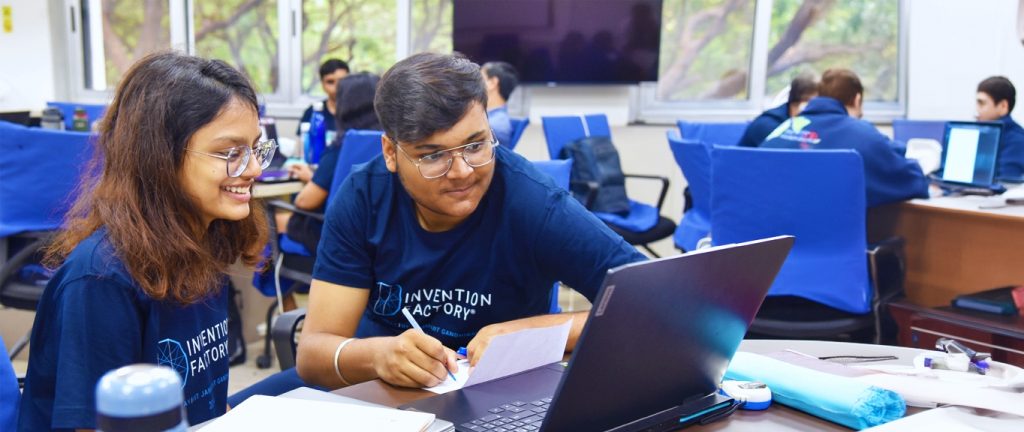
The event began with mentors noting how students arrived brimming with ideas that evolved into impressive prototypes. What differentiates IF from other similar student-driven programs is the ability of the student teams to present their ideas and thought processes to an esteemed panel of guest evaluators every week. This is unlike other programs where only the finished prototypes are presented at the end without any scope for improvement while the products are being developed.
The jury was impressed with the participants’ innovative solutions to real-life issues. After all ten teams presented their prototypes, the jury carefully evaluated them based on cost, practicality, patent design, and production costs, ultimately shortlisting five teams for the second round.
This year’s jury included the who’s who of the business world and entrepreneurs themselves. They were:
– Ruyintan Mehta
President, WIN Foundation
– Sudarshan Saraf
Owner, Technocraft Industries India Ltd.
– Nikhil Gupta
CEO and Fund Manager, Marwari Catalysts Fund
– Vijay Nehra
COO, RattanIndia Enterprises Ltd.
– Ganesh Raja
CEO, Kotak Education Foundation
– Ajit Balakrishnan
Founder, Rediff.com
– Santosh Gharpure
Professor In-Charge SINE & Perfumery Chair Professor Department of Chemistry, IIT Bombay
– Nayan Patel
Director, Packam Controls Pvt. Ltd.
Prototypes: Details of the Prototypes Presented
The top five teams shortlisted for the second round were:
1. Therapeutic Pain Relief Device (1st place)
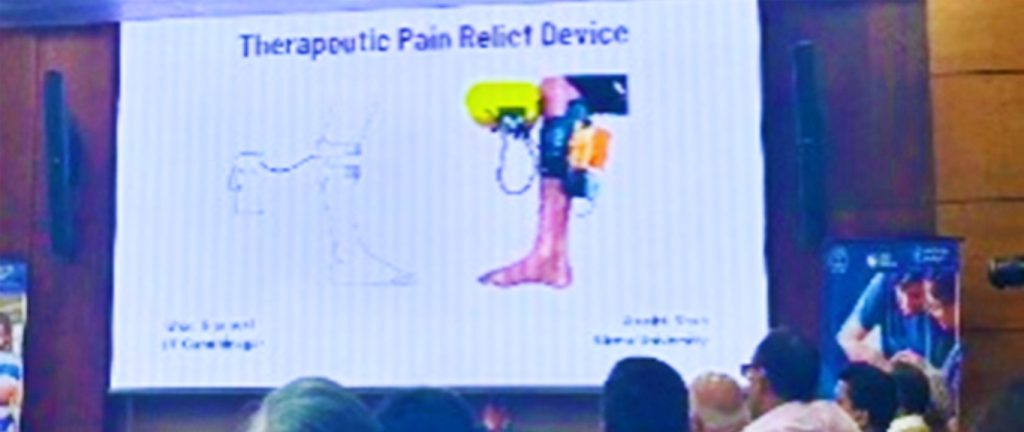
Developed through thorough research with physiotherapists, this pain relief device massages specific pain points and includes an inbuilt oil bottle section for applying oil during the massage. The device features a Velcro strap to fasten it to the painful area, allowing users to start the massage without directly touching ointments or oils, thus avoiding irritation.
– Target Audience: Office workers, elders, athletes, and people with varicose veins.
– Features: Controls the intensity of pressure and the amount of medicine used, serves as an alternative to expensive physiotherapy sessions, and is compact.
– Jury Interaction: Questions focused on the materials used, approximate production cost, and usability.
2. Add-On for Food Delivery (2nd place)
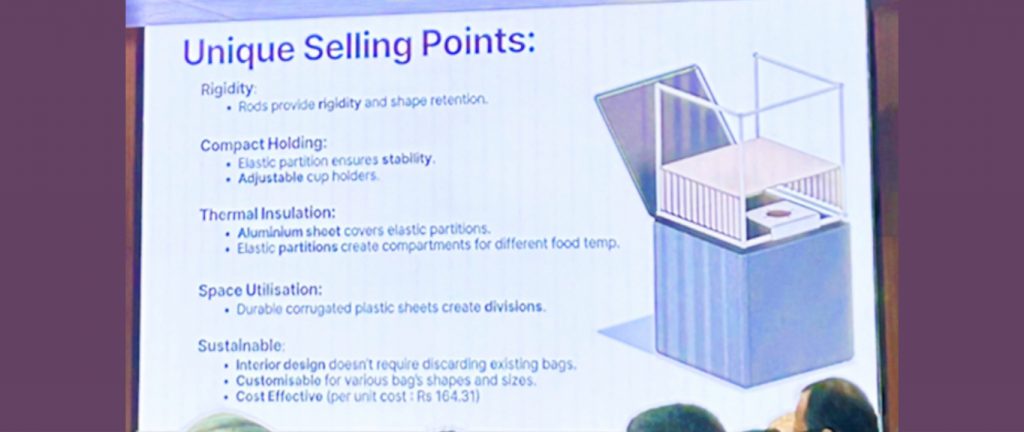
This product is a frame that fits into the food delivery bags of services like Zomato and Swiggy. It includes a cup holder and sections made of Velcro, allowing more food boxes to be securely stacked and delivered.
– Jury Interaction: Questions focused on cost, longevity, practicality, and patent aspects.
3. Safe Soldier Assist (3rd place)
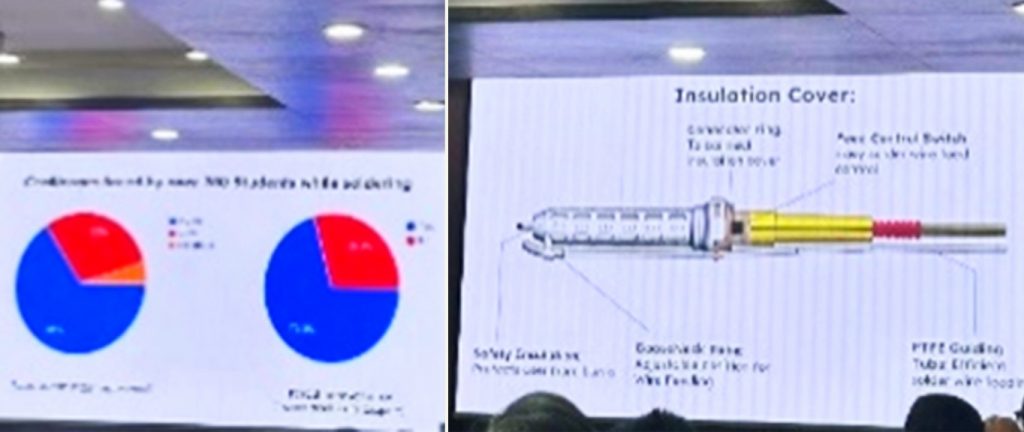
To address the issue of burns from soldering irons, this modular device features an insulation cover and a welding device, ensuring safety and efficiency. The product is attachable, works with one-handed operation, and includes a separate spool and feeding mechanism, as well as ventilation for cooling.
– Jury Interaction: Questions covered the origin of the idea, the prototype, and how the product offers more precision compared to existing solutions.
4. Adjustable Self-Measuring Liquid Dispensary Cap
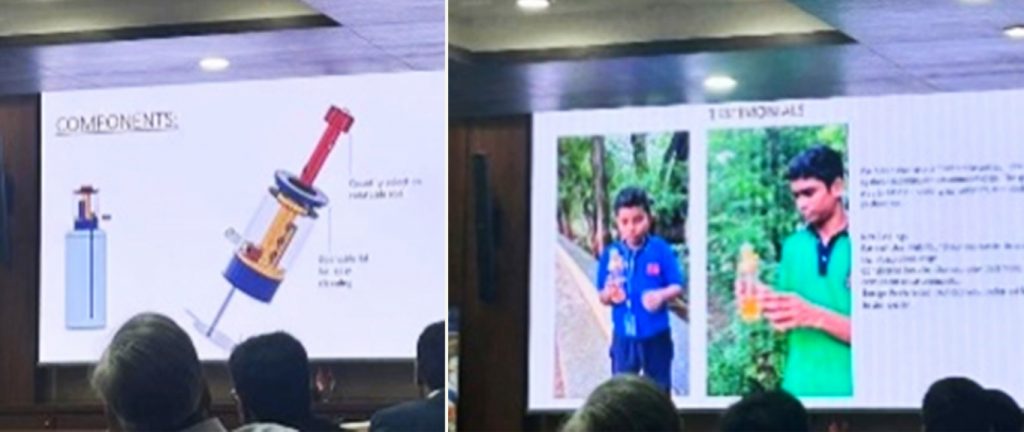
This cap aims to provide consistent liquid measurements, replacing traditional bottle caps. Users can select the quantity by rotating a knob, invert the bottle to fill a chamber, and then dispense the liquid. It also includes an additional nozzle for a controlled flow of oils and sauces.
– Target Audience: Parents, healthcare providers, home cooks, chefs, elderly people, and their caregivers.
– Jury Interaction: Questions on biodegradability, product limitations, accuracy, and use cases.
5. Mountable Garbage Compactor
Designed for large dustbins, this product helps utilize the full capacity of dustbins by compacting the garbage, allowing more waste to fit in.
Other prototypes included:
6. Horizontal Dough Extruder
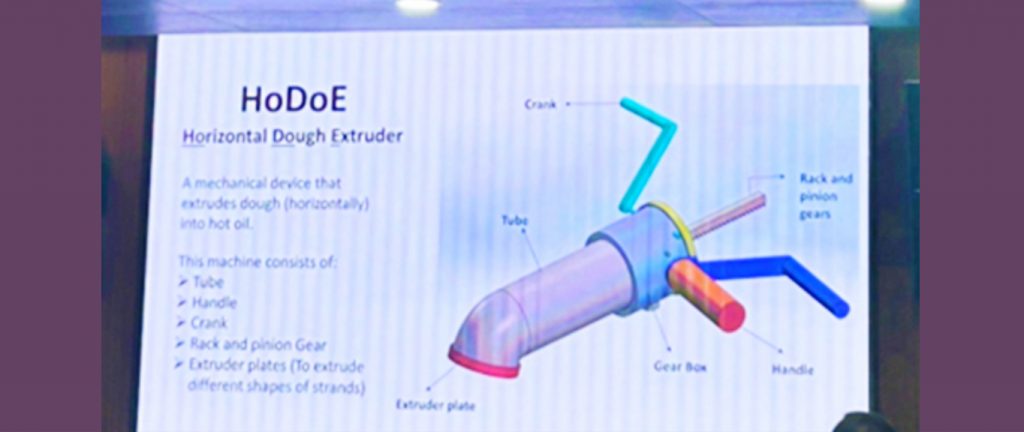
This device is for making noodles, murukku, idiyappam, and similar foods. It reduces hand burns by directly pouring noodles into the oil and is time-saving and easy to clean.
7. Coconut Xtractor
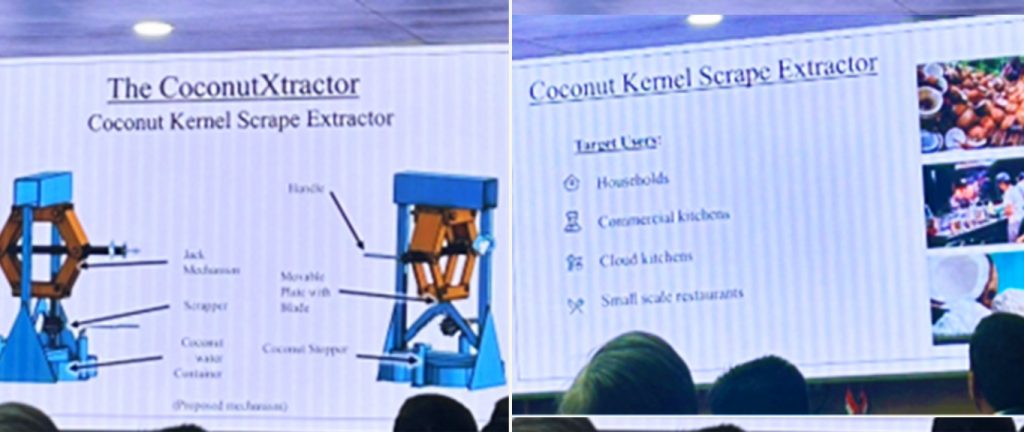
This machine breaks coconuts into two equal halves, collects the coconut water, and scrapes the coconut for consumption. It targets households, commercial kitchens, cloud kitchens, and small-scale restaurants.
8. Egg Shell Breaker
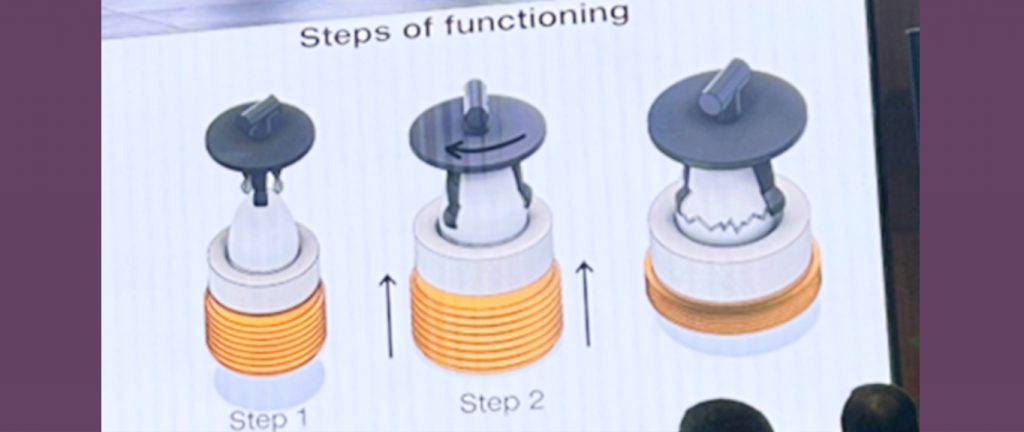
This product peels boiled eggs, although it cannot peel the top of the egg. Users place the egg in the container and rotate it to peel.
9. Retrieve Easy
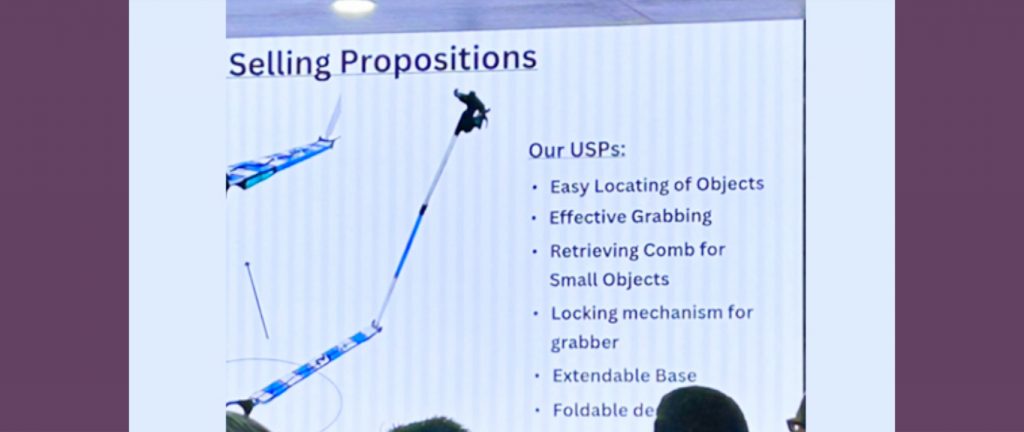
This product helps retrieve items dropped in dark corners by connecting to a phone via cable and using a camera with integrated light to view and retrieve the items.
10. Fresh Alert
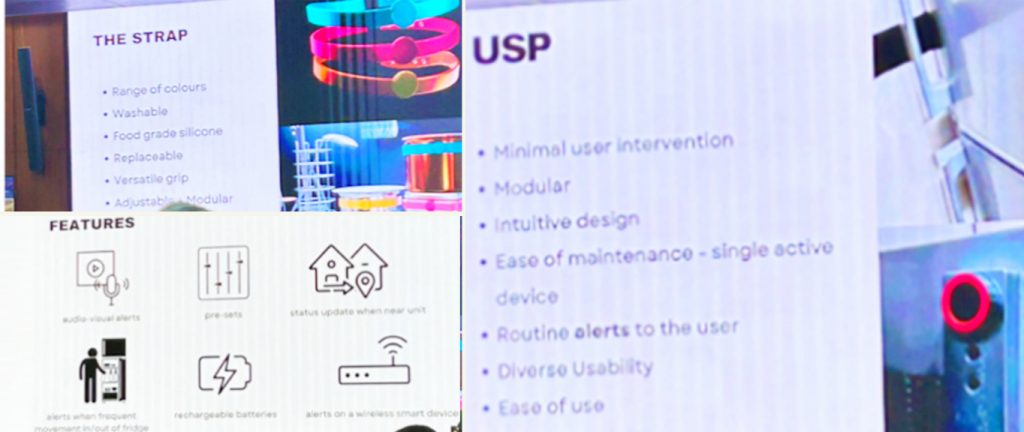
This product sends reminders to phones about the remaining time before food items spoil, helping prevent wastage. Different coloured bands are attached to food boxes for easy tracking and organizing.
Jury’s Take on the Event

Mr. Ganesh Raja Image Courtesy: LinkedIn
Mr. Ganesh Raja was deeply moved by the student teams at the finale and said that the day was filled with learning and unlearning and felt enriched by the participants’ collective wisdom. He praised the students’ impressive performance, particularly their quick turnaround in six weeks, and suggested extending the program to two months to enhance outcomes and attract investors. Highlighting the program’s potential for marketability, he also emphasized the importance of commercial viability, scalability, profitability, and sustainability, with a nod to incorporating advanced technologies like AI. Although his favourite prototype aimed at improving services like Zomato and Swiggy didn’t win, he said that it stood out for its market potential.
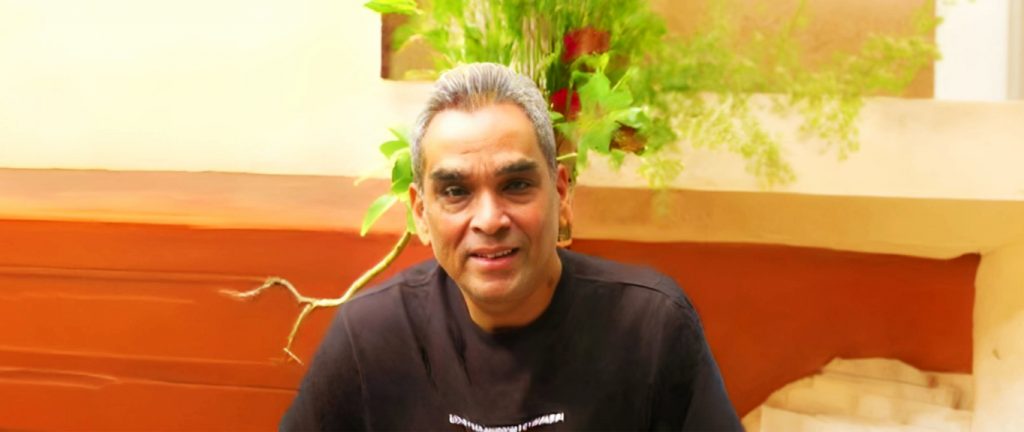
Mr. Ajit Balakrishnan Image Courtesy: LinkedIn
Mr. Ajit Balakrishnan, founder of Rediff.com, found the Invention Factory finale extremely educational and contrasted his work with algorithms and machine learning at Rediff.com with the practical, creative solutions presented by students. He was impressed by projects like a coconut scraping machine and devices for compacting garbage and measuring drug intake flow, which showcased practical inventiveness. Mr. Balakrishnan noted the students’ creativity and enthusiasm, emphasizing the real-world applicability of their projects. He suggested expanding the program to more engineering colleges and eventually medical and business schools. Highlighting the practical benefits of the students’ innovations, especially for rural areas, he expressed a personal connection to the winning prototype addressing leg strain and offered to financially support its manufacturing with a donation of Rs. 5 to 10 lakhs.
Conclusion
In his closing speech, IIT Bombay’s esteemed alumnus, Mr. Hemant Kanakia, emphasized the importance of teamwork, noting that collaboration is critical in today’s world. He highlighted the value of time pressure in the program, mirroring real-world scenarios, and the challenge of presenting and defending ideas. He praised the participants for taking constructive feedback positively and shared his vision to scale the event in the future and file over 200 patents.
***********
As the sun set on IIT Bombay’s third iteration of the Invention Factory, the Institute stood tall in its commitment to fostering innovation among budding engineers not only from its campus but from across the nation. By providing a platform where creativity meets practicality, IIT Bombay continues to empower young minds to tackle real-world challenges with ingenuity and determination. This commitment to nurturing innovation not only contributes to technological advancements but also aligns with IIT Bombay’s broader mission of nation-building, where these innovations are poised to make meaningful impacts in various sectors and drive India towards a brighter and more sustainable future.

